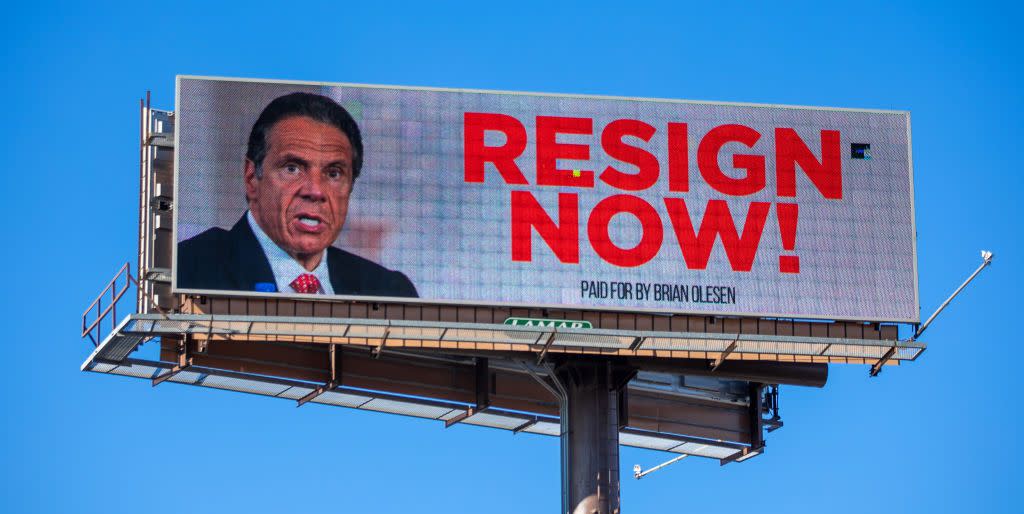Andrew Cuomo’s Non-Apology Is an Insult to Women

- Oops!Something went wrong.Please try again later.
On Wednesday, after a third woman came forward alleging him of sexual misconduct, New York Governor Andrew Cuomo held a press conference to issue an apology. “I now understand that I acted in a way that made people feel uncomfortable,” he said. “I never knew at the time that I was making anyone feel uncomfortable.”
“It was unintentional,” he said, “and I truly and deeply apologize for it.” But Cuomo’s apology did not come across as an acknowledgement of any wrongdoing. It sounded like the non-apologies of so many powerful men who have been accused of sexual misconduct; an apology that concedes only that women have feelings, but continues to value the good intentions of men over the actual lived experiences of the women they have harmed. The impression that one might get from the events, as described in Cuomo’s statement, is that he’s just a clumsy oaf who committed a series of embarrassing faux pas—not a man who wields serious power and influence.
The accounts by the women, by contrast, portray something darker: a pattern of predatory behavior exerted over younger women in vulnerable positions by one of the most powerful elected officials in the country. Last week, former Cuomo aide Lindsey Boylan, 36, published an account on Medium in which she alleged, in detail, how Cuomo expressed sexual interest in her, attempted to isolate her, and made unwanted sexual advances. Days later, a former Cuomo aide, 25-year-old Charlotte Bennett, told the New York Times that Cuomo asked her inappropriate questions about her romantic life. “I understood that the governor wanted to sleep with me, and felt horribly uncomfortable and scared,” Bennett told the Times. “And was wondering how I was going to get out of it and assumed it was the end of my job.” In an appearance on CBS Evening News, Bennett, who had told Cuomo she was a sexual assault survivor, said the governor "asked if I had trouble enjoying being with someone because of my trauma." On Wednesday, a third woman, 33-year-old Anna Ruch alleged Cuomo grabbed her face and asked to kiss her in an uncomfortable encounter at a wedding in 2019.
Cuomo’s apology casts his behavior as impolite or boorish, saying, “I now understand that my interactions may have been insensitive or too personal and that some of my comments, given my position, made others feel in ways I never intended.” But Cuomo is not some naive political newcomer. At 63, he is one of the most prominent elected officials in the country, and has leaned into his brand as New York’s bulldog. He is aware of how his personality affects others: “My natural instinct is to be aggressive, and it doesn't always serve me well. I am a controlling personality,” he wrote in his last memoir.
Sexual harassment is a form of exerting control and power, a symptom of the sort of bullying that apparently pervades Cuomo’s entire style of governance in politics. The women’s accounts expose the uglier aspects of what the media has already reported about the environment that Cuomo and his top brass cultivate: a toxic culture of fear and harassment. Karen Hinton, a communications consultant who once worked with Cuomo, told the Times, “His primary tool for governing is to create fear.”
The heart of the issue isn’t whether or not Cuomo intended harm, or whether or not he knew that Ruch, Boylan, and Bennett were uncomfortable by his invasive, sexual questions or unwanted advances. The issue is that their feelings simply did not matter to him. In fact, in her account to the Times, Ruch said that upon meeting Cuomo at a friend’s wedding, he placed his hand on her “bare lower back.” She physically removed his hand, to which he allegedly responded that she was “aggressive,” and then grabbed her face, asking her, “Can I kiss you?” Cuomo allegedly took a clear signal that the behavior was unwelcome as an invitation for more advances. What Ruch wanted, or didn’t want, was irrelevant.
Maddeningly, Cuomo’s apology boosts his own credibility by casting doubt on whether the feelings of these women can really be trusted. In a separate statement issued last Sunday, addressing the claims of Boylan and Bennett, Cuomo suggested that the women had misinterpreted his behavior, which he described as “being playful,” making “jokes that I think are funny,” and as teasing. “I acknowledge some of the things I have said have been misinterpreted as an unwanted flirtation,” he wrote.
That is insulting, and plays into the idea that, as CNN commentator S.E. Cupp told Don Lemon, women are “perpetually in a state of confusion: We don’t get your jokes. We misinterpret you constantly. We have no sense of humor. And we’re just unreliable witnesses.” The underlying message of Cuomo’s apology is this: Women have feelings, but those feelings misinterpreted my nice actions towards them.
The New York Attorney General’s office is investigating the allegations of sexual harassment, along with a second, parallel investigation into the governor’s handling of nursing homes deaths amid the pandemic, and Cuomo vowed in his press conference that he has “learned from this.” However, the lesson that Cuomo seems to have extracted is that “sensitivities have changed and behavior has changed.” Let’s be clear: women are not more “sensitive” than before; what is changing (albeit slowly) is the fact that men can abuse their power and remain unquestioned. Any lessons for Cuomo won’t come through apologies or public statements, but by accountability.
You Might Also Like

